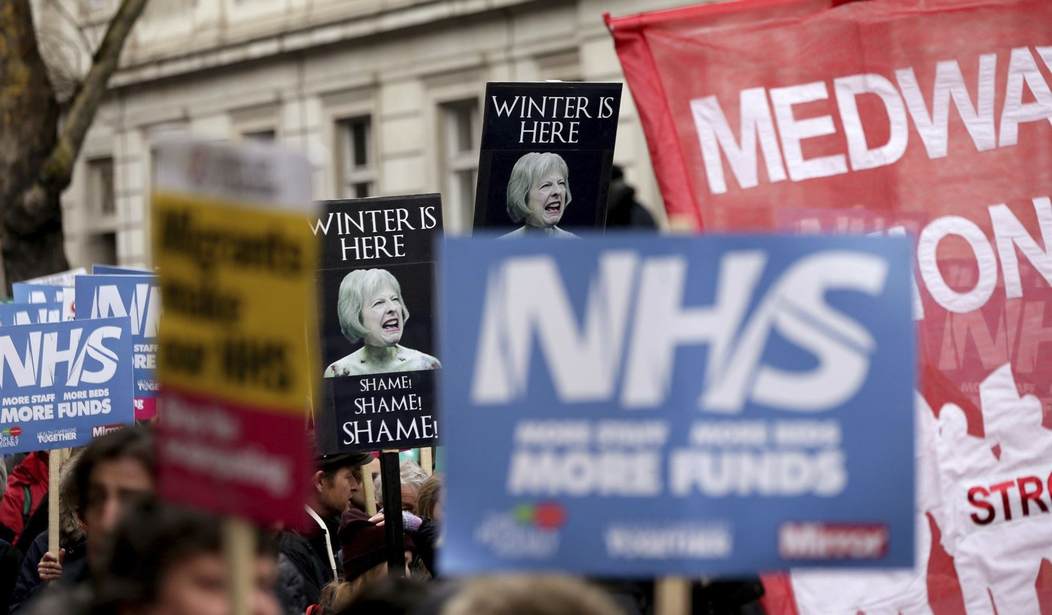One hundred and twenty-five years ago, Great Britain was the "workshop of the world," making and selling products across its vast Empire upon which the "sun never set."
In 2025, the "workshops" are an illusion. And so are the workers. The sun set long ago on the British Empire, as did everything that made Great Britain a world power and an economic dynamo.
The two world wars in the 20th century took something vital from the British people. The human cost in lives, the financial cost of paying for the two conflicts, and the psychological cost to the people led to a significant loss of traditional values, challenging the existing social and political order.
How has this affected the British people in real terms?
One particularly jarring statistic is that 25% of Great Britain's working-age men and women are idle. They are being paid up to $37,000 a year to sit at home, freeloading off the 75% of British taxpayers who support them.
The ludicrous number of people who should be working but aren't is a direct result of the government's — both the Labor and Tory Parties' — crazy policies on disability.
Some people are considered "disabled" if they suffer from "acne, constipation, obesity, 'old age,' irritable bowel syndrome, writer's cramp, and food intolerances," reports Reason.com.
The real surprise is the tens of thousands of young people who are now economically inactive due to long-term sickness. A National Health Service (NHS) Confederation report showed that in 2021–22, over 63,000 people went straight from studying to being economically inactive due to long-term sickness. In 2002, mental and behavioral problems were the main condition for 25 percent of claimants. In 2024, that figure rose to 44 percent. More than half of the rise in disability claims since 2019 was due to mental health or behavioral conditions, according to the Institute for Fiscal Studies.
What is going on?
About 69 percent of those who apply for sickness benefits mention depression, anxiety, or some other kind of mental or behavioral disorder. Mental illness is now being cited by 48 percent of disabled working Brits, making mental health the single biggest problem. Mental illness, quite clearly, is responsible for a large portion of the spike in claimants.
In Illinois, a recipient of aid from the alphabet soup of federal agencies doling out welfare benefits for housing, food, cell phones, etc, to poor people can receive up to $47,900 for a single mother, head of household. A married couple can get up to $41, 200. Welfare benefits will be available to some households earning as much as $74,880 annually. What's more, there's an army of federal bureaucrats beating the bushes, desperately looking for clients to cover.
In Great Britain, a total of 1.75 million people received enhanced personal independence payments (PIP). This is a program created to keep people off welfare. The only problem is that only one-sixth of recipients of the PIP payments are actually working.
Recommend: Is America Finally Ready for a Serious Third Party?
The largest increases in welfare payments went to people with mental health disorders.
In 2019, the number of PIP claimants for autism was 26,256, and by April 2025, this number had jumped to 114,211. For anxiety and depression, it went from 23,647 in 2019, to 110,075 in April 2025. For ADHD, in the same period, it went from 4,233 to 37,339.
As ludicrous as this sounds, approximately 80 percent of PIP claimants are not in work at all. A person getting incapacity benefits and PIP could be getting 23,899 pounds (roughly $32,250), which is already more than the minimum wage. Someone with children is entitled to even more. When PIP is combined with housing benefits, universal credit, and other offerings, someone could be entitled to 27,354 pounds (roughly $37,000) without paying taxes.
Many of these people may well suffer from mental health conditions that make work a struggle. However, in economic terms, the incentives are entirely off. If you can earn more by claiming benefits than you can working, why would you try to work?
Amy from Keighley is 30 years old with an eight-year-old child and gets long-term sickness benefits. "I do suffer with mental health issues…[complex post-traumatic stress disorder], anxiety, and depression, and things like that," she said. Amy appeared in the documentary Britain's Benefits Scandal.
"If I went and got a job tomorrow, everything I get would stop from today. Which would then mean that my rent, everything would stop….Where does that leave my 8-year-old?" she asked. Amy says she would need to earn $47,000 after taxes to duplicate the package of benefits she receives now.
It the UK and America, it's called "The Welfare Trap." Liberals created it unintentionally, believing they were "solving" the problem of poverty. Instead, they trapped generations into a complex web of dependency that, in the UK, is destroying the nation's economy and fiscal policy.
Help PJ Media continue to tell the truth about the Trump administration's accomplishments as we usher in the Golden Era of America. Join PJ Media VIP and use promo code FIGHT to get 60% off your membership.










Join the conversation as a VIP Member